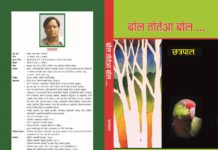Since the day Bashambharji has become a havaldar, Paro Maasi has started applying the cute looking large readymade bindi on her forehead. Earlier, her make up was limited to walnut-rind brushing to redden her lips, collyrium for the eyes and ornamentals used to do setting of hair. The first thing she did after leaving her bed in the morning, was to dress herself up and apply make-up. Half of her life had been spent as a constable’s wife. Bashambharji’s salary was forty rupees a month. That was all she had to meet all the household expenses- food, clothes and all. Shanghai velvet and satin were beyond her reach. She barely managed to get a chheent and rubia suit or at best a terricot suit but anything she wore, became of her. God had endowed her with finely chiseled features and she never missed to show them off. She already had a thick shinning laung in her nose. After she became Mrs. Halvaldar, she got herself a high-healed pair of sandals. She also started using stylish glasses. Paro Massi was an engaging conversationalist and a woman of character who made her presence felt; wherever she went and stood as a pillar of support to all and sundry in good times and bad. If there was a marriage in a family she could be seen there forewarning them about different rituals that it entailed. If there was a death in some house, she was in the forefront, to lead the wailing women, as though her own daughter was dead. With her being on the scene, there was no possibility of any item of the obsequies, from wailing and dispatching of the funeral procession from the house, to the observance of the tenth day or the thirteenth after death, getting missed. She knew all the details of the religious observances. It was for this reason that everyone felt greatly relieved when she took charge of the ceremonies. In Dogra country-side, on occasions of marriage and death, relatives get easily offended if the do not get due attention or something goes amiss. It’s not so among Kashmiries; on such occasions, it’s the relatives who take upon themselves all the responsibilities like cleaning rice, cooking and serving, freeing the members of the concerned families from the burden. Dogras are lacking in the spirit of cooperation among them; they miss no opportunity to pick holes and find faults. But in the house where Maasi Havaldarni was in position, nobody dared find fault with or run down the family. She was capable of silencing any voices of complaints with her commanding personality. Her only weakness was that she must take on the leadership role; she suffered from the ambition of getting respect and had no interest in mundane things, like food etc. She was a good-hearted woman who gave more than anyone else.
It was only now that Paro Maasi had become Havaldarni. Even as a constable’s wife, she never held back her hand from giving. Bashambharji’s salary was only forty rupees no doubt, but Paro Maasi’s house could produce at any time whatever was needed. If somebody was in need of a pinch of ajwain or a drop of Amrit-dhara, or wild mint or tulsi leaves, lavang or asafoetida, he or she could rush to Paro Maasi at any odd hour and get it. She was woman of worldly wisdom and had kept in stock at home odds and ends like a pomegranate seeds etc. A sympathetic, friendly and well-meaning woman like her, lacked nothing and people gave her freely. She herself never asked for anything nor did she ever show any need for help. She was a nayan1 (barber caste) but she never demanded from anybody her due.
Families served by her called her and gave her things to her without the jhiri2 knowing about it. One has to win somebody’s affections to get something. When the parents of a newly married bride requested Paro Maasi to accompany the bride’s palanquin to her in-laws, the Jhiri who had the legitimate claim to go, dared not show her disappointment in her presence. Paro Maasi knew how to please the new in-laws with her fulsome praises and benedictions, when she congratulated them on getting such good relations as the bride’s parents; the bride’s mother thanked her by giving her two emptied tins of ghee, a couple of jute bags, a lot of sweets, and so many other small items left over after the ceremony and even offered to carry these things to her house.
A person who appears happy and lively, may have problems in life and one understands them only when he comes close to him. Life is a bed of roses only for a person who has learnt to walk on thorns. Those who bemoan their troubles and miseries, are slowly abandoned to be alone. Who has the time to go around wiping another’s tears these days? Who doesn’t have enough troubles of his own? Maasi Havaldarani had learnt to live on her own resources for a long time now. She was grateful to the Almighty. He had given her good healthy physique to help others. If sometimes, she happened to cross words with someone, she would never make her conscious of what she had done for her. If some one told her, “You, so and so, why do you take pains to go around and help people?” She would coolly reply with a smile and say, “Sister, once I am dead this body won’t be fit food for crows and dogs! The people whom I serve will serve will not go with me or send me to heaven, will they?” the acquaintance would be dumbfounded with her curt answer.
However patient a person may be and of high moral, there are moments when he may spill over like a pot overflowing. Paro Maasi also lost patience with her sweet-natured husband-Bashambhar occasionally. And she had good reason to be angry. Bashambhar, perhaps knew of it and never questioned her. It is her business to run the house with his salary and if she spends something on others after fulfilling her obligations, who was he to question her? And what was his earning after all? For a long time he got just forty rupees! Now he gets enough. There was no extra income earlier and where was the source for any such income? Sometimes when the river Tawi was in spate during the rains, he would get five to seven head loads of fuel wood that came floating down. Or he would sometimes get some fried gram and jiggery from the prisoners in the jail to get them cigarettes/bidis from outside. Conditions in the jail had since changed and more facilities were available to the prisoners; they were entitled to concessions and facilities according to their class-status. There are hardly any prisoners awarded rigorous punishment now-a-days. Jail life earlier was real hard. Not to speak of abuses and kicks from the officers, even jail constables would rough up and abuse the prisoners and browbeat them on the strength of their uniforms. But on some festive occasions, the prisoners got puris and halwa and on the full moon day they got kheer. A cake of washing soap for a week and two cakes of toilet soap a month. They wouldn’t have any cash to spend. So, Bashambharji received only some gram and jiggery over and above his salary.
Paro Maasi was irritated more by her husband’s much too soft nature than his meager income. Four families living in a common compound, shared water from a single tap. Water-filling often gave rise to squabbles. Paro also faced such occasions and retired with her irritation to her room and Bashambhar, sitting inside, would start blaming the other families and this made her angrier still. She would lose her temper and tell the Halvaldar, “Who made you a havaldar? Father of so and so, you are not fit even to talk to the man next door. If you are the son of your father, go out and arrange a separate tap. But you are not bothered, are you? Because you get all the pots already filled up. You are fit only to be a yesman to women. The maximum you can do is to sit beside me near the hearth and while I make chapattis, you push forward the burning logs in the hearth”. Paro Maasi is right. Whenever there is some occasion in her parents’ or in her-in-laws’ place, it’s she who has to worry. The Havaldar only follows her tamely. Paro Maasi has not only to get clothes stitched for the family but also to get ready a proper outfit for the Havaldar. If he is not properly dressed, it’s she who will suffer the humiliation. People never fail to comment and carry tales. In the eyes of the people, Paro Maasi is a smart, resourceful, leader-type woman who doesn’t allow her man take any initiative; taking everything upon herself. But close relatives of Paro Maasi know that if she had not strained herself, she couldn’t have made the home she did. The family would have been in straits long before. It is Paro Maasi alone who is responsible for building up a self-sufficient well-knit home. She does so many things for so many people-from finding suitable toys for somebody’s kid, to arranging a maid for another. She cannot afford to spend from her own pocket but she never shirks from physical effort.
Havaldarni Maasi possesses courage and perseverance of a high order. When Jagatu’s motherless daughter eloped with the washerman Jagatu came to Paro alone to let out his anguish. Paro kept the whole thing to herself and came to Jagatu’s rescue like a man. She brought the girl from the washer men’s quarters during the night itself, fixed up a boy from the girl’s caste and got her married to him in Arya Samaj Bhawan the very next morning and dispatched the girl to her in-law’s house. When Jagtu removed-his turban from his head and placed it at her feet, she said, “Please, do not do anything of this kind. Your daughter is a good as mine. And the honour of your family is the honour of my family. Today it has happened to you, tomorrow, it may happen to me. We cannot claim to be absolutely spotless.” Havaldarni Maasi has given succor to many and thus fulfilled her commitment to human values and duty towards fellow beings.
Havaldarni Maasi is an illiterate woman. And yet she rubs shoulders with the high brows. She knows the ways of cultured people. What is more, she keeps herself well-informed not only of happenings in the city and the state but also of national and international news. When there is no electricity, she doesn’t fail to use the battery-cell-powered transistor to listen to the news. For her, Bashambharji is the Havaldar, no doubt, but is Paro Maasi instead who deserves to be called Havaldar, for her alertness, quick grasp and action-oriented temperament.
________________
1.barber caste
2.water filler caste



![Hello Maya [Translated In English By: Suman Sharma]](https://www.dogri.org/wp-content/uploads/2020/05/Book_Cover-218x150.jpg)







Nice story…I always felt there was a character like her around when Iwas young…can’t say for now.
डोगरी भाषाशास्त्रियों को मेरा प्रणाम। मैं देवेन्द्र कैरवान भारतीय प्रौद्योगिकी संस्थान, मुम्बई में परियोजना प्रबंधक के पद पर कार्यरत हूँ। हमें अंग्रेजी-डोगरी अनुवादकों और डबिंग करने वालों की आवश्यकता है, जो फ्रीलांसर के तौर पर कार्य कर सकें। अधिक जानकरी के लिए कृपया dkairwan@gmail.com पर संपर्क करें।